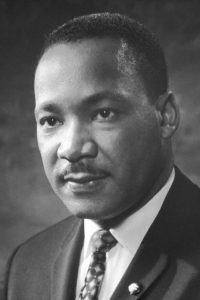 “The ultimate measure of a man is not where he stands in moments of comfort and convenience, but where he stands in times of challenge and controversy.”
“The ultimate measure of a man is not where he stands in moments of comfort and convenience, but where he stands in times of challenge and controversy.”
Rev. Dr. Martin Luther King Jr. wrote these words in “Strength of Love,” a collection of his sermons published in 1963, as he was preparing for the Birmingham Campaign. The campaign would incorporate sit-ins and boycotts to attempt to overturn the city of Birmingham’s segregationist systems. King had no way of knowing whether Birmingham would be successful, or that he would end up in jail for a time and the campaign would etch into history books the images of Bull Connor’s dogs and fire hoses being turned on peaceful marchers.
He was about to make history – in Birmingham, at the March on Washington, as a Nobel laureate, and in so many more ways. But even without knowing what was to come, King’s approach to history was understanding complex relationships. His beliefs were essential to his historical vision of America as a democracy that has never lived up to – and even refused to live up to – its principle that all are created equal.
Many communities of color are angry; filled with anguish, despair, hopelessness, and broken trust; and discouraged by the current state of race relations. Our policy makers have created a climate that perpetuates social and economic disparity.
As we look back over the past 18 months, what do we see? We see a country in turmoil – turned upside down, inside out; angry mobs marching down our streets and our communities; white supremacist and anti-Semitic groups inciting chaos and lawlessness, defaming our nation’s Capitol.
During the first eight months of 2020, at least 164 black men and women were murdered by police. I weep every time I watch the video of George Floyd’s death. Could anyone with any compassion have ignored the desperate pleas of a man crying out, “I Can’t Breathe?” Where is the humanity of those protecting our communities? Many of us are disappointed, hurt, angry and just fed up with the current legal system. White supremacy and anti-Semitic groups have no place in our criminal legal system, or government, and most importantly, the White House. And yes, Black lives matter every second, every minute, every hour, and every day.
As we celebrate and focus on the life and legacy of Dr. King today and this month, we must remember what it means for the integrity of our democracy. If we want to benefit from Dr. King’s dreams, we must focus on developing our students’ critical thinking and moral compass. There is no denying that life can be complicated and navigating the challenging waters of interpersonal relationships and complex decision-making can be difficult. But this is the work. And as a law school, we must continue to educate future lawyers who will both defend and rebuild our democratic institutions but with an eye towards finally achieving equality for all.
We hope you will help us celebrate Dr. King’s legacy and join us in creating a community ready to embrace change. We all must be more empathic and compassionate toward others and offer more grace. At Mitchell Hamline, we welcome and work towards a more diverse, equitable, and inclusive legal field where everyone is made to feel comfortable expressing their race, ethnicity, gender, national origin, sexual orientation, gender identity, gender expression, religion, and all other dimensions of their social and cultural identity. This is the reason why we are calling for bold social action to support our communities of color. Dr. King’s hope was that we stand side by side to create a better tomorrow.
We are in a time of challenge and controversy. Where will you stand?
Sharon Van Leer
Senior Program Manager
Office of Diversity, Equity, and Inclusion
